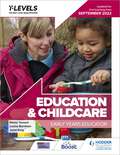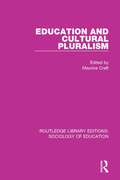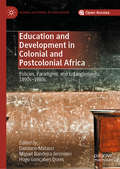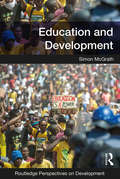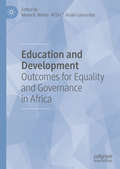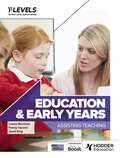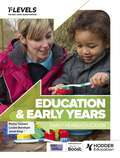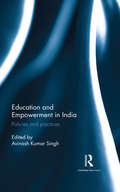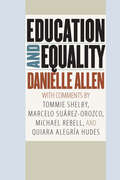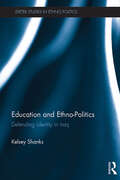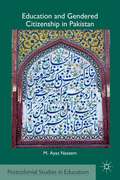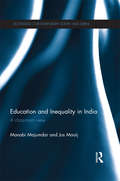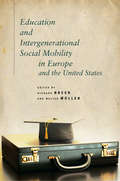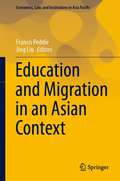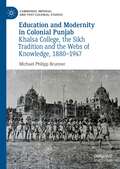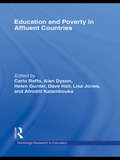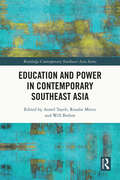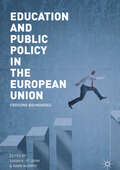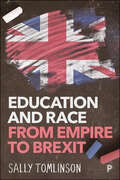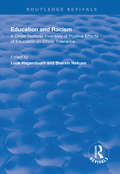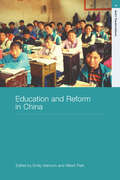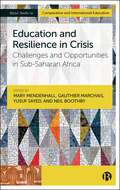- Table View
- List View
Education and Childcare T Level: Early Years Educator: Updated for first teaching from September 2022
by Penny Tassoni Louise Burnham Janet KingBegin your path to a career in Education and Childcare with this T Level textbook that covers both the core content and the education and childcare specialism content you will need to understand to be successful in your qualification. For first teaching from September 2022.Develop your understanding of the key principles, concepts, theories and skills that will give you a solid foundation of knowledge to support you during your industry placement.Created in partnership with CACHE and written by highly respected authors Penny Tassoni, Louise Burnham and Janet King, you can feel confident relying on the insights and experience of these experts.- Track and consolidate your learning using the learning outcomes at the beginning of every unit and Test Yourself questions throughout each unit- Ensure you don't miss any important terminology with key terms highlighted and defined in context- Contextualise your learning with case studies, reflection tasks and practice points- Prepare for your examinations with knowledge-based practice questions- Understand how to approach your assignments with practical tasks and model answers
Education and Childcare T Level: Early Years Educator: Updated for first teaching from September 2022
by Penny Tassoni Louise Burnham Janet KingBegin your path to a career in Education and Childcare with this T Level textbook that covers both the core content and the education and childcare specialism content you will need to understand to be successful in your qualification. For first teaching from September 2022.Develop your understanding of the key principles, concepts, theories and skills that will give you a solid foundation of knowledge to support you during your industry placement.Created in partnership with CACHE and written by highly respected authors Penny Tassoni, Louise Burnham and Janet King, you can feel confident relying on the insights and experience of these experts.- Track and consolidate your learning using the learning outcomes at the beginning of every unit and Test Yourself questions throughout each unit- Ensure you don't miss any important terminology with key terms highlighted and defined in context- Contextualise your learning with case studies, reflection tasks and practice points- Prepare for your examinations with knowledge-based practice questions- Understand how to approach your assignments with practical tasks and model answers
Education and Cultural Pluralism (Routledge Library Editions: Sociology of Education #16)
by Maurice CraftThis collection of essays, first published in 1984, on multicultural education seeks to introduce teachers, teacher educators, educational administrators, policymakers and others to several of the most significant dimensions of the field. But it also brings out the complexity of the issues and the dangers of over-simplification, the inadequacies of much of the available data, and the need for better long-term strategies.
Education and Development in Colonial and Postcolonial Africa: Policies, Paradigms, and Entanglements, 1890s–1980s (Global Histories of Education)
by Miguel Bandeira Jerónimo Damiano Matasci Hugo Gonçalves DoresThis open access edited volume offers an analysis of the entangled histories of education and development in twentieth-century Africa. It deals with the plurality of actors that competed and collaborated to formulate educational and developmental paradigms and projects: debating their utility and purpose, pondering their necessity and risk, and evaluating their intended and unintended consequences in colonial and postcolonial moments. Since the late nineteenth century, the “educability” of the native was the subject of several debates and experiments: numerous voices, arguments, and agendas emerged, involving multiple institutions and experts, governmental and non-governmental, religious and laic, operating from the corridors of international organizations to the towns and rural villages of Africa. This plurality of expressions of political, social, cultural, and economic imagination of education and development is at the core of this collective work.
Education and Development: Education, Training And Development In Africa (Routledge Perspectives on Development)
by Simon McGrathThis title explores the place of education in development debates and provides a systematic as well as a theoretical overview of the main approaches to education and development. It emphasises the fact that education is profoundly shaped by national and local cultures even if many issues are shared across institutions in different locations. Education and Development discusses different theoretical accounts from different disciplinary traditions to help students understand the complexity of the overall debate. The text does not shy away from discussions of education’s negative impacts, and insists that an account of education must include consideration of early childhood development, adult, vocational and higher education, as well as the growing range of informal and distance forms. It includes chapters on human capital, human rights and human development, and on education, gender and development, and draws on examples from a wide range of countries and regions such as India, Hong Kong, Kenya and South Africa. The book has a well-developed pedagogy including text boxes, chapter summaries, key questions, links to websites and videos, and annotated further reading sections. Particular attention is paid to ensuring that a plurality of voices, contexts and educational sub-sectors are represented in the boxes, weblinks and references. Education and Development provides an introductory overview to the field, aimed at the undergraduate level, while critically engaging with key themes and questions. The book will also be of interest to development practitioners, policymakers, entrepreneurs and corporate employees engaged in aspects of education and development work.
Education and Development: Outcomes for Equality and Governance in Africa
by N’Dri T. Assié-Lumumba Muna B. NduloThis edited volume addresses a critical aspect of development in Africa: the intersection between education and governance. Using case studies and experiences from different parts of the continent, this book assesses how the potential for human resources, in terms of education, can be leveraged in the development process to achieve equity, inclusive development and governance outcomes in Africa. This book builds on the "resource curse" to focus on human resources as an alternative paradigm to sustainable development in Africa. At a time when concerns over access to quality education is an important issue among policy makers and international development agents, this timely project calls attention to one of the most critical aspects of development in Africa.
Education and Early Years T Level: Assisting Teaching
by Penny Tassoni Louise Burnham Janet KingBegin your path to a career in Education and Early Years with this T Level textbook that covers both the core content and the assisting teaching specialism content you will need to understand to be successful in your qualification. For first teaching from September 2023.Develop your understanding of the key principles, concepts, theories and skills that will give you a solid foundation of knowledge to support you during your industry placement.Created in partnership with NCFE and written by highly respected authors Penny Tassoni, Louise Burnham and Janet King, you can feel confident relying on the insights and experience of these experts.- Track and consolidate your learning using the learning outcomes at the beginning of every unit and Test Yourself questions throughout each unit- Ensure you don't miss any important terminology with key terms highlighted and defined in context- Contextualise your learning with case studies, reflection tasks and practice points- Prepare for your examinations with knowledge-based practice questions- Understand how to approach your assignments with practical tasks and model answers
Education and Early Years T Level: Assisting Teaching
by Penny Tassoni Louise Burnham Janet KingBegin your path to a career in Education and Early Years with this T Level textbook that covers both the core content and the assisting teaching specialism content you will need to understand to be successful in your qualification. For first teaching from September 2023.Develop your understanding of the key principles, concepts, theories and skills that will give you a solid foundation of knowledge to support you during your industry placement.Created in partnership with NCFE and written by highly respected authors Penny Tassoni, Louise Burnham and Janet King, you can feel confident relying on the insights and experience of these experts.- Track and consolidate your learning using the learning outcomes at the beginning of every unit and Test Yourself questions throughout each unit- Ensure you don't miss any important terminology with key terms highlighted and defined in context- Contextualise your learning with case studies, reflection tasks and practice points- Prepare for your examinations with knowledge-based practice questions- Understand how to approach your assignments with practical tasks and model answers
Education and Early Years T Level: Early Years Educator
by Penny Tassoni Louise Burnham Janet KingBegin your path to a career in Education and Early Years with this T Level textbook that covers both the core content and the early years educator specialism content you will need to understand to be successful in your qualification. For first teaching from September 2023.Develop your understanding of the key principles, concepts, theories and skills that will give you a solid foundation of knowledge to support you during your industry placement.Created in partnership with NCFE and written by highly respected authors Penny Tassoni, Louise Burnham and Janet King, you can feel confident relying on the insights and experience of these experts.- Track and consolidate your learning using the learning outcomes at the beginning of every unit and Test Yourself questions throughout each unit- Ensure you don't miss any important terminology with key terms highlighted and defined in context- Contextualise your learning with case studies, reflection tasks and practice points- Prepare for your examinations with knowledge-based practice questions- Understand how to approach your assignments with practical tasks and model answers
Education and Early Years T Level: Early Years Educator
by Penny Tassoni Louise Burnham Janet KingBegin your path to a career in Education and Early Years with this T Level textbook that covers both the core content and the early years educator specialism content you will need to understand to be successful in your qualification. For first teaching from September 2023.Develop your understanding of the key principles, concepts, theories and skills that will give you a solid foundation of knowledge to support you during your industry placement.Created in partnership with NCFE and written by highly respected authors Penny Tassoni, Louise Burnham and Janet King, you can feel confident relying on the insights and experience of these experts.- Track and consolidate your learning using the learning outcomes at the beginning of every unit and Test Yourself questions throughout each unit- Ensure you don't miss any important terminology with key terms highlighted and defined in context- Contextualise your learning with case studies, reflection tasks and practice points- Prepare for your examinations with knowledge-based practice questions- Understand how to approach your assignments with practical tasks and model answers
Education and Empowerment in India: Policies and practices
by Avinash Kumar SinghThis book explores the critical linkages between education and empowerment of women, marginalized groups and other disadvantaged sections of society. It: Provides an overview of educational policies and practices from India’s independence to the present day, and tracks relevant changes and amendments. Examines a range of issues connected with education such as the Right to Education Act; empowerment and community mobilization; higher education challenges and other emerging topics. Brings together both theoretical postulates and empirical findings.
Education and Equality
by Danielle AllenAmerican education as we know it today--guaranteed by the state to serve every child in the country--is still less than a hundred years old. It's no wonder we haven't agreed yet as to exactly what role education should play in our society. In these Tanner Lectures, Danielle Allen brings us much closer, examining the ideological impasse between vocational and humanistic approaches that has plagued educational discourse, offering a compelling proposal to finally resolve the dispute. Allen argues that education plays a crucial role in the cultivation of political and social equality and economic fairness, but that we have lost sight of exactly what that role is and should be. Drawing on thinkers such as John Rawls and Hannah Arendt, she sketches out a humanistic baseline that re-links education to equality, showing how doing so can help us reframe policy questions. From there, she turns to civic education, showing that we must reorient education's trajectory toward readying students for lives as democratic citizens. Deepened by commentaries from leading thinkers Tommie Shelby, Marcelo Suárez-Orozco, Michael Rebell, and Quiara Alegría Hudes that touch on issues ranging from globalization to law to linguistic empowerment, this book offers a critical clarification of just how important education is to democratic life, as well as a stirring defense of the humanities.
Education and Ethno-Politics: Defending Identity in Iraq (Exeter Studies in Ethno Politics)
by Kelsey ShanksThe Iraqi Disputed Territories consist of 15 districts stretching across four northern governorates. While an administrative solution for the disputed territories remains evasive, minority groups across the region have been pulled into a clash over demographic composition as each disputed district faces ethnically defined claims. Meanwhile, inter-ethnic communal tensions are rising and questions of identity increasingly overshadow day-to-day life. There has been little research on the impact of heightened identity politics on the everyday lives of citizens. Regardless of the final administrative outcome, the multi-ethnic population of the region requires services and systems of co-existence, and in the fragile ethno-political environment of the disputed territories, the way in which the education system manages ethnic diversity is crucial. It is within this context that Education and Ethno-Politics examines the development of education systems across the region post 2003. Drawing on over 50 interviews with regional education officials and community representatives, the book presents the impact of amplified ethno-politics on the reconstruction of education in Iraq. It provides the first academic exploration into education in the region, exploring the significance of cultural reproduction and the link between demands for ethnically specific education, societal security and the wider political contestation over the territory. A comprehensive analysis of the powerful role of education in identity-based conflicts, this book offers a highly insightful examination of Iraq's past and present, as well as formulating policy recommendations for its future. It is an essential resource for students, scholars and policy makers with focus on the Middle East, specifically Iraqi and Kurdish studies, as well as those interested in Education policy and Conflict studies.
Education and Gendered Citizenship in Pakistan
by M. Ayaz NaseemThis book challenges the uncritical use of the long held dictum of the development discourse that education empowers women. Situated in the post-structuralist feminist position it argues that in its current state the educational discourse in Pakistan actually disempowers women.
Education and Inequality in India: A Classroom View (Routledge Contemporary South Asia Series)
by Manabi Majumdar Jos MooijUniversalization of primary education has been high on the policy agenda in India. This book looks at the reproduction of social inequalities within the educational system in India, and how this is contested in different ways. It examines whether the concept of `education for all’ is just a mechanically conceived policy target to chasing enrolment and attendance or whether it is a larger social goal and a deeper political statement about the need for attacking entrenched social inequalities. Drawing on original data collected in the two states of Andhra Pradesh and West Bengal, the authors present the multiple ways in which social class impinges on the educational system, educational processes and educational outcomes. The book goes on to explore issues around autonomy and accountability via an analysis of the position of teachers within the educational hierarchy, and by looking at the various possibilities of making teachers accountable. Recommendations related to the necessity for a larger debate and normative framework are made, including whether private schools should play a role, and whether it is necessary to move from government action and responsibilities to a broader concept of public action. The book presents in interesting contribution for students and scholars of South Asian studies, as well as Education and Public Policy studies.
Education and Intergenerational Social Mobility in Europe and the United States (Studies in Social Inequality)
by Walter Müller Richard BreenThis volume examines the role of education in shaping rates and patterns of intergenerational social mobility among men and women during the twentieth century. Focusing on the relationship between a person's social class and the social class of his or her parents, each chapter looks at a different country—the United States, Sweden, Germany, France, the Netherlands, Italy, Spain, and Switzerland. Contributors examine change in absolute and relative mobility and in education across birth cohorts born between the first decade of the twentieth century and the early 1970s. They find a striking similarity in trends across all countries, and in particular a contrast between the fortunes of people born before the 1950s, those who enjoyed increasing rates of upward mobility and a decline in the strength of the link between class origins and destinations, and later generations who experienced more downward mobility and little change in how origins and destinations are linked. This volume uncovers the factors that drove these shifts, revealing education as significant in promoting social openness. It will be an invaluable source for anyone who wants to understand the evolution of mobility and inequality in the contemporary world.
Education and Migration in an Asian Context (Economics, Law, and Institutions in Asia Pacific)
by Jing Liu Francis PeddieThis edited book explores the complex and multifaceted connections between education and migration in an Asian context from multiple perspectives. It features studies from China, Japan, India, the Philippines, Thailand, and Timor-Leste and covers diverse migration and education experiences. These experiences encompass internal and international migration and forced displacement, as well as questions surrounding education such as school choice, education provision and training as human capital; education and social inclusion; and student performance in a post-conflict context. By covering a wide range of questions and situations, the original scholarship in this book reveals how human development concerns and higher rates of movement within and outside of Asian countries operate on multiple levels in a globalized world.
Education and Modernity in Colonial Punjab: Khalsa College, the Sikh Tradition and the Webs of Knowledge, 1880-1947 (Cambridge Imperial and Post-Colonial Studies)
by Michael Philipp BrunnerThis book explores the localisation of modernity in late colonial India. As a case study, it focuses on the hitherto untold colonial history of Khalsa College, Amritsar, a pioneering and highly influential educational institution founded in the British Indian province of Punjab in 1892 by the religious minority community of the Sikhs. Addressing topics such as politics, religion, rural development, militarism or physical education, the study shows how Sikh educationalists and activists made use of and ‘localised’ communal, imperial, national and transnational discourses and knowledge. Their modernist visions and schemes transcended both imperialist and mainstream nationalist frameworks and networks. In its quest to educate the modern Sikh – scientific, practical, disciplined and physically fit – the college navigated between very local and global claims, opportunities and contingencies, mirroring modernity’s ambivalent simultaneity of universalism and particularism.
Education and Poverty in Affluent Countries (Routledge Research in Education)
by Dave Hall Lisa Jones Carlo Raffo Alan Dyson Helen Gunter Afroditi KalamboukaFor the first time, researchers, policymakers and practitioners across the world will have access to a comprehensive mapping of research evidence and policy strategies about education and poverty in affluent countries. Although there is widespread agreement that poverty and poor educational outcomes are related, there are competing explanations as to why that should be the case. This is a major problem for practitioners, policy makers and researchers who are looking for pointers to action, or straightforward ways of understanding an issue that troubles education systems across the world. This unique book brings scholarship and analysis from some of the most influential researchers and writers on education and poverty within one text. The authors provide a synthesising framework that will help researchers and policy makers to examine future educational policy in a holistic and comprehensive fashion.
Education and Power in Contemporary Southeast Asia (Routledge Contemporary Southeast Asia Series)
by Rosalie Metro Will Brehm Azmil TayebThis book focuses on education and power in Southeast Asia and analyzes the ways in which education has been instrumentalized by state, non-state, and private actors across this diverse region. The book looks at how countries in Southeast Asia respond to the endogenous and exogenous influences in shaping their education systems. Chapters observe and study the interplay between education and power in Southeast Asia, which offers varying political, social, cultural, religious, and economic diversities. The political systems in Southeast Asia range from near consolidated democracy in Indonesia to illiberal democracy in Singapore and Thailand to the communist regime in Laos to absolute monarchy in Brunei. Structured in three parts, (i) centralization and decentralization, (ii) privatization and marketization, and (iii) equity and justice, these themes are discussed in single-country and/or multi-country studies in the Southeast Asian region. Bringing together scholars from and focused on Southeast Asia, this book fills a gap in the literature on education in Southeast Asia.
Education and Public Policy in the European Union: Crossing Boundaries
by Mark Murphy Sarah K. St. JohnThis book fleshes out activities and initiatives in the field of education from across areas of European Union competence in order to highlight the extent to which education and training have penetrated the European Community’s policymaking since its creation. Policies are all too often placed in their individual silos, which can sometimes work against deeper understanding of policymaking and its reach across policy domains. This project avoids such compartmentalisation and instead crosses boundaries to explore education’s relationship with other policy areas, as well as its far-reaching role in the construction of a united Europe. It demonstrates education’s significance across the broad landscape of European integration by presenting a collection of case studies, which represent policy areas that have experienced the infiltration of education. These include: Migration, Health, Agriculture, Multilingualism, Media and Communications, and the environment.
Education and Race from Empire to Brexit
by Sally TomlinsonCovering the period from the height of Empire to Brexit and beyond, this book shows how the vote to leave the European Union increased hostilities towards racial and ethnic minorities and migrants. Concentrating on the education system, it asks whether populist views that there should be a British identity - or a Scottish, Irish or Welsh one - will prevail. Alternatively arguments based on equality, human rights and economic needs may prove more powerful. It covers events in politics and education that have left most white British people ignorant of the Empire, the often brutal de-colonisation and the arrival of immigrants from post-colonial and European countries. It discusses politics and practices in education, race, religion and migration that have left schools and universities failing to engage with a multiracial and multicultural society.
Education and Racism: A Cross National Inventory of Positive Effects of Education on Ethnic Tolerance (Routledge Revivals)
by Louk Hagendoorn Shervin NekueeFirst published in 1999, this book gives an inventory of factors contributing to ethnic prejudice in seven countries and the role of formal education among them on the basis of national surveys. It appears that education is crucial in all the countries surveyed and contributes to more tolerant views of ethnic and national minorities in Western European countries, Poland and the United States. The positive effects of education, however, do not always counter the negative effects of personality characteristics and conservative values on ethnic prejudice. Moreover, the negative effects of less formal education may be reinforced by perceived economical competition of ethnic minorities and thereby further bolster prejudiced views of the less educated. This indicates that formal education alone is not sufficient to change prejudiced views. Other forms of socialization transmitting values leading to open-mindedness and the ability to secure one's economic position have to support the positive effects of formal education as well.
Education and Reform in China (Routledge Studies in Asia's Transformations)
by Emily Hannum Albert ParkTransformative market reforms in China since the late 1970s have improved living standards dramatically, but have also led to unprecedented economic inequality. During this period, China’s educational system was restructured to support economic development, with educational reforms occurring at a startling pace. Today, the educational system has diversified in structure, finance, and content; it has become more market-oriented; and it is serving an increasingly diverse student population. These changes carry significant consequences for China’s social mobility and inequality, and future economic prospects. In Education and Reform in China, leading scholars in the fields of education, sociology, demography, and economics investigate the evolution of educational access and attainment, educational quality, and the economic consequences of being educated. Education and Reform in China shows that economic advancement is increasingly tied to education in China, even as educational services are increasingly marketized. The volume investigates the varying impact of change for different social, ethnic, economic and geographic groups. Offering interdisciplinary views on the changing role of education in Chinese society, and on China’s educational achievements and policy challenges, this book will be an important resource for those interested in education, public policy, and development issues in China.
Education and Resilience in Crisis: Challenges and Opportunities in Sub-Saharan Africa (Bristol Studies in Comparative and International Education)
by Sweta Gupta Danielle Falk Daniel Shephard Cyril Brandt Dieudonné Kanyerhera Diego De la Fuente Stevens Samuel Matabishi Abby Mills Ygal Sharon Shukrani Salvatory Ashika Sharma Abdi Bihi Hanaf Muktar Hersi Mohamed Bang Chuol Aditi DesaiThis book provides an important lens for understanding how interlocking humanitarian crises caused by armed conflict, natural disasters, forced displacement and, more recently, a global health pandemic have adversely impacted teaching and learning. It brings together evidence from multiple, diverse research-practice partnerships in seven countries: the Democratic Republic of the Congo, Ethiopia, Niger, Somalia, South Sudan, Tanzania and Uganda. The authors provide a clear account of the key academic, policy and practice questions on education in crisis contexts and consider our capacity to develop just and resilient education systems.
